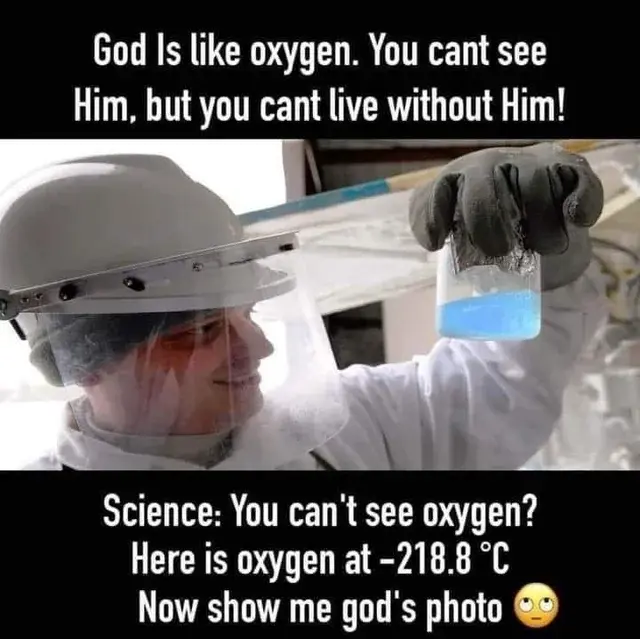this post was submitted on 01 Dec 2023
980 points (94.8% liked)
Atheist Memes
5600 readers
2 users here now
About
A community for the most based memes from atheists, agnostics, antitheists, and skeptics.
Rules
-
No Pro-Religious or Anti-Atheist Content.
-
No Unrelated Content. All posts must be memes related to the topic of atheism and/or religion.
-
No bigotry.
-
Attack ideas not people.
-
Spammers and trolls will be instantly banned no exceptions.
-
No False Reporting
-
NSFW posts must be marked as such.
Resources
International Suicide Hotlines
Non Religious Organizations
Freedom From Religion Foundation
Ex-theist Communities
Other Similar Communities
!religiouscringe@midwest.social
founded 1 year ago
MODERATORS
you are viewing a single comment's thread
view the rest of the comments
view the rest of the comments

You can empirically prove math like you'd empirically prove other things - make predictions based on math and test these predictions. But it seems like you are expecting these proofs to be like mathematical proofs - uncompromising logic that leaves no room for getting false positives by chance. They won't. They'll be like all other empirical proofs - "mere" scientific theories that must forever live with the possibility - however improbable - that the universe somehow aligned to make all the predictions come true even though the hypothesis they were derived from is wrong.
But this is not a property of the math we were trying to prove. This is just the nature of the empirical proofs. Implying, based on that, that math is less verifiable than all the physical observable things (like frozen oxygen) is ridiculous - the proofs for these things suffer from the exact same problem!
The (poorly) argued point they are trying to make is the distinction between the empirically identified congruences between the math and the internally consistent tautological truth of the math itself.
The reason I bring this up is your point about math modeling empirical evidence is an important distinction. Where their argument truly breaks down is the idea that all internally consistent tautologies are of equal value to us as humans. This is obviously false.
And frankly, their other argument about this showing that true things exist without empirical proof is offensively stupid since we already have much better proofs demonstrating that true things exist without proof.
Isn't this a contradiction? These "much better proofs" are proofs - which means that these "true things" are not "without proof".
Also, I'm not sure what "things" you have in mind here, but I'm fairly certain they don't "exist" in the same sense math does. Math exists in the same hard sciences do - any mathematical discovery, just like discoveries, is a rule that reality follows. Of course, I'm not implying that the mere formulation of this rule by human researchers is what gives it the power to govern the universe - we are just discovering laws that were already there.
Other things that are derived from human thought (rather than empirical evidence) and do not fall under the wide umbrella of math, don't exist the same sense. You may claim that justice exists, but it'd be silly to expect the universe to obey to principles of justice. It won't be silly to expect it to obey to mathematical principles.
Had @NoLifeGaming@lemmy.world brought something like justice as their example, we could have talked about the meaning of existence and what does it mean for God to exist in the same way justice exists. But they didn't - and I really try to avoid formulating other people's claims for them, because even if I get it right they may still find (or invent) some nuance I got slightly wrong, leverage that to claim I understand nothing about their philosophy, and derail the entire conversation to revolve around that.
They didn't mention these other "true things" that "exist without empirical proof". They mentioned math. And math can be proven empirically using material evidence and the scientific method (of course, you need to make sure you are not trying to prove the parts of math that are crucial for the scientific method itself, because then your proof will be circular...)
Godels proof is quite clear. There are infinitely many assertions that are true but have no proof. Those assertions can be mapped to extant things. This is not an area that requires deliberation. If you are unfamiliar with the incompleteness theorum we can discuss it more. The fantastically great thing about this work is that it was the pursuit of a "complete" purely philosophical logic derivation of mathematical principles (the continuation of the work by Bertrand in the Principia Mathematica).
The thing here is we are arguing two different points... You are arguing that empirical evidence can demonstrate the usefulness of models to explain more empirical evidence... Which is true. I am arguing that philosophy builds models. You aren't wrong(except that part about not trying to prove the parts that are crucial for the scientific method... You are just wrong about that) and I am not wrong. We are arguing different things.
Godel's proof is about our inability to prove some theorems mathematically, but that does not mean we cannot prove them scientifically. Such proofs, of course, will suffer from the same problem all scientific proofs have - a certain probability that even though our model is wrong, somehow by pure chance our tests ended up showing otherwise (in technical term - non-zero p values)
I'm not saying that one must never attempt to prove these foundations. What I'm saying is that if you try to prove them empirically (as oppose to how they are usually proved - mathematically) using the scientific method, you will run into the circular reasoning fallacy: